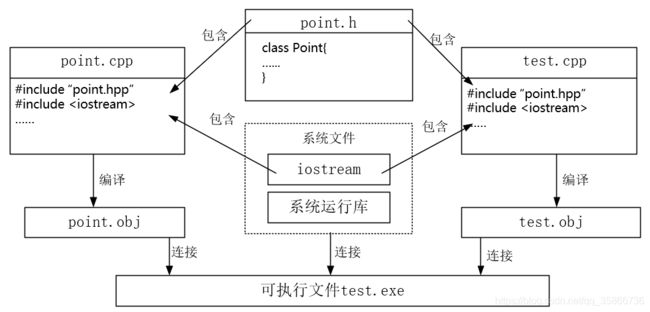类的静态成员、类的友元、共享数据的保护、多文件结构
目录
-
- 类的静态成员
-
- 静态数据成员
- 静态函数成员
- 类的友元
-
- 友元函数
- 友元类
- 共享数据的保护
-
- 常类型
-
- 常对象举例
- 常成员函数举例
- 常数据成员举例
- 常引用举例
- 多文件结构
-
- 声明和定义的重新理解
- 外部变量
- 外部函数
- 多文件结构的编译过程
类的静态成员
静态数据成员
- 用关键字
static在声明(声明都是在类体内完成的) - 为该类的所有对象共享,静态数据成员具有静态生存期
- 必须在类外定义和初始化,用
::来指明所属的类。- 静态数据成员在类外定义和初始化是有原因的,主要目的是为了灵活设定静态数据的初始值。
静态函数成员
- 类外代码可以使用类名和作用域限定符来调用静态成员函数
- 静态成员函数主要用来处理该类的静态成员数据,可以直接调用静态成员函数。
- 如果访问非静态成员函数,可以通过对象来访问。
#include 类的友元
- 友元是C++提供的一种破坏
数据封装和数据隐藏的机制。 - 通过将一个模块A声明为另一个模块B的友元,则模块A能够引用到模块B中本是被隐藏的信息。
- 类的友元可以分为:友元函数和友元类。
为了确保数据的完整性,及数据封装与隐藏的原则,建议尽量不使用或少使用友元。
友元函数
友元函数是在类声明中由关键字friend修饰说明的非成员函数,在它的函数体中能够通过对象名访问private和protected成员
作用:增加灵活性,使程序员可以在封装和快速性方面做合理选择。
友元函数访问对象中的成员必须通过对象名。
示例: 使用友元函数计算两点间的距离
#include 友元类
- 若一个类为另一个类的友元,则此类的所有成员都能访问对方类的私有成员。
声明语法:将友元类名在另一个类中使用friend修饰说明。
class A {
friend class B; // 类中友元函数的声明可以放在任何地方,不受public、protected和private的管辖和限制
public:
void display() {
cout << x << endl;
}
private:
int x;
};
class B {
public:
void set(int i);
void display();
private:
A a; // 注意被声明为友元类的类,要通过被访问类的对象进行访问该类的成员变量和成员函数
};
void B::set(int i) {
a.x=i;
}
void B::display() {
a.display();
};
注意:类的友元关系是单向的
共享数据的保护
- 对于既需要共享、又需要防止改变的数据应该声明为常类型(用
const进行修饰)。
对于不改变对象状态的成员函数应该声明为常函数。
常类型
- 常对象:必须进行初始化,不能被更新。
- 通过常对象只能调用它的常函数成员。常对象不可调用非常成员函数
- 定义格式:
const 类名 对象名或类名 const 对象名
- 常成员:用
const进行修饰的类成员:常数据成员常函数成员:不更新对象的数据成员类型说明符 函数名(参数表)const;这里,const是函数类型的一个组成部分,因此在实现部分也要带const关键字。
- 常引用:被引用的对象不能被更新
- 格式:
const 类型说明符 &引用名
- 格式:
- 常数组:数组元素不能被更新
- 格式:
类型说明符 const 数组名[大小]...
- 格式:
- 常指针:指向常量的指针
常对象举例
class A{
public:
A(int i,int j) {
x=i; y=j;}
...
private:
int x,y;
};
A const a(3,4); //a是常对象,不能被更新
常成员函数举例
#include常数据成员举例
为什么要在构造函数中完成对常数据成员的初始化赋值操作?
因为常数据成员只能赋值一次,当对象被创建时,会自动调用构造函数,对成员数据进行赋初值,如果不指定,通常被赋值为0,而0不一定时我们想要的数值。
#include 常引用举例
常引用作形参
- 如果用常引用做形参,便不会意外地发生对实参的更改。这要既能高效的访问引用对象,又能保证被引用对象的安全
#include 如何理解初始化列表???
多文件结构
声明和定义的重新理解
声明和定义是两码事,声明仅仅是给编译器作提示用,定义是编译器实实在在地把内容转换成二进制代码,分配内存空间,作为可执行的特定指令。所以声明可以有多处,但是同一内容却只能定义一次以避免定义二义性和模糊性。用extern就是明确告诉编译器这是在声明,而不是定义。
对于函数的声明,加不加extern都行,因为函数的声明后面会跟一个分号,很容易辨识。但是,基本变量的定义和声明在不加extern时,都会被对待为定义,所以要想使用其他文件的全局变量,必须在引用的文件中用extern声明。
外部变量
- 如果一个变量除了在定义它的源文件中可以使用外,还能被其他文件使用,那么就称这个变量为外部变量。
- 文件作用域中定义的变量,默认情况下就是外部变量,但在其他文件中如果需要使用这一变量,就需要用extern关键字加以声明。
外部函数
- 在所有类之外声明的函数(也就是非成员函数),都是具有文件作用域的。
- 这样的函数可以在不同的编译单元中被使用,只要在调用之前进行引用性声明(即声明函数原型)即可。也可以在声明函数原型时用
extern修饰,其效果与不加修饰的默认状态是一样的。
将变量和函数限制在编译单元内
- 使用匿名的命名空间:在匿名命名空间中定义的变量和函数,都不会暴露给其他的编译单元。
namespace{
// 被namespace{...}括起来的区域都属于匿名的命名空间。
int n;
void f(){
n++;
}
}
